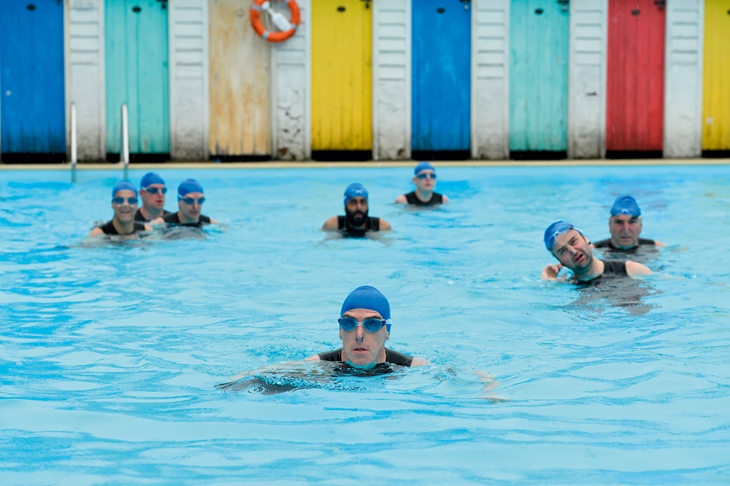Swimming with Men is a British drama-comedy starring Rob Brydon as a disaffected middle-aged accountant who joins his local male synchronised-swimming team, doesn’t bond with any of his teammates, doesn’t learn about what matters in life, catches athlete’s foot plus several verrucas, then throws himself from a bridge. Of course, that isn’t this film, but if it were, it would be a film I hadn’t seen before.
The fact is, familiarity is often fine — and comforting. The Full Monty, Calendar Girls, Brassed Off, Kinky Boots and all the other films of this ilk: fine, and always comforting. Plus, I’d seen the poster — Carson from Downton in Speedos! — and was a little bit excited, I have to say. But it has no fresh smarts, is shamelessly derivative (it’s even billing itself as The Pool Monty) and, most unforgivably, perhaps, it asks us to root unquestioningly for men who are asshats, essentially. Well, I won’t.
Directed by Oliver Parker (Johnny English Reborn, Dad’s Army), and scripted by Aschlin Ditta (The Catherine Tate Show), the film stars Brydon as Eric — always Eric in these instances; never Sebastian. He hates his job and is (stupidly) convinced that his wife (a thankless role for Jane Horrocks) is having an affair, so walks out on her and their teenage son. This does not make Eric an especially sympathetic character in my book. It makes him an asshat. But there you are, and here he is, doing his usual evening lengths in the local pool when he notes a group of schlubby men singularly failing to master their synchronised-swimming routine. He steps in to explain why — it’s all to do with the maths, apparently — and before you know it he’s joined them. The other members of the team are played by Jim Carter (Carson in Speedos! But you get over that quite quickly), Rupert Graves, Daniel Mays, Thomas Turgoose and Adeel Akhtar. But there are, in fact, two others in the team who are barely named and kept in the background, which is a distraction. Who are these men and why aren’t any of the others engaging with them? What function are they serving? And: why not simply restrict the team to six, if your budget is not going to run to eight speaking parts? I’ve witnessed some fairly odd film decisions down the years but this one does seem especially insane.
The men meet regularly to practise and begin to reveal their inner lives, inevitably. Their stories aren’t woven through the narrative but come in the form of exposition blurted down the pub. At one point Graves’s character invites Eric back to his houseboat, where he looks longingly and self-pityingly at the framed photograph of his kids. He only sees them occasionally, he explains, because he left their mother for a much younger ballerina (always a much younger ballerina, never an appropriately aged lollipop lady) who then left him, so now he’s on his own, but that’s OK, because at least he’s learned something about life, and matured. Only kidding. He’s now hankering after the team’s coach (a thankless role for Charlotte Riley), who is half his age. The asshat.
No cliché is left unturned as training montages fill the screen and dates fly off the calendar leading up to the group competing at the World Synchronised Swimming Championships in Milan, and so on and blah-de-blah. You know the drill. The film is prosaically directed by Parker, and while Brydon can be a wonderful, understated actor, he can’t bring depth to Eric because Eric has no depths, and he can’t bring life to a script that is neither trenchant nor witty.
At this stage I would normally say, let’s not be too harsh, there were some funny moments. Well, maybe there were some funny moments, but for the life of me I can’t recall any of them now. I can’t even remember if much comedy was made from the contrast between the delicacy of the water movements and all their flailing dadbods. It is forgettable because, unlike other films of this ilk, there is nothing properly at stake, there is no social underpinning and, unlike The Full Monty specifically, it has nothing to say about masculinity, aside from: some men are asshats.






Comments